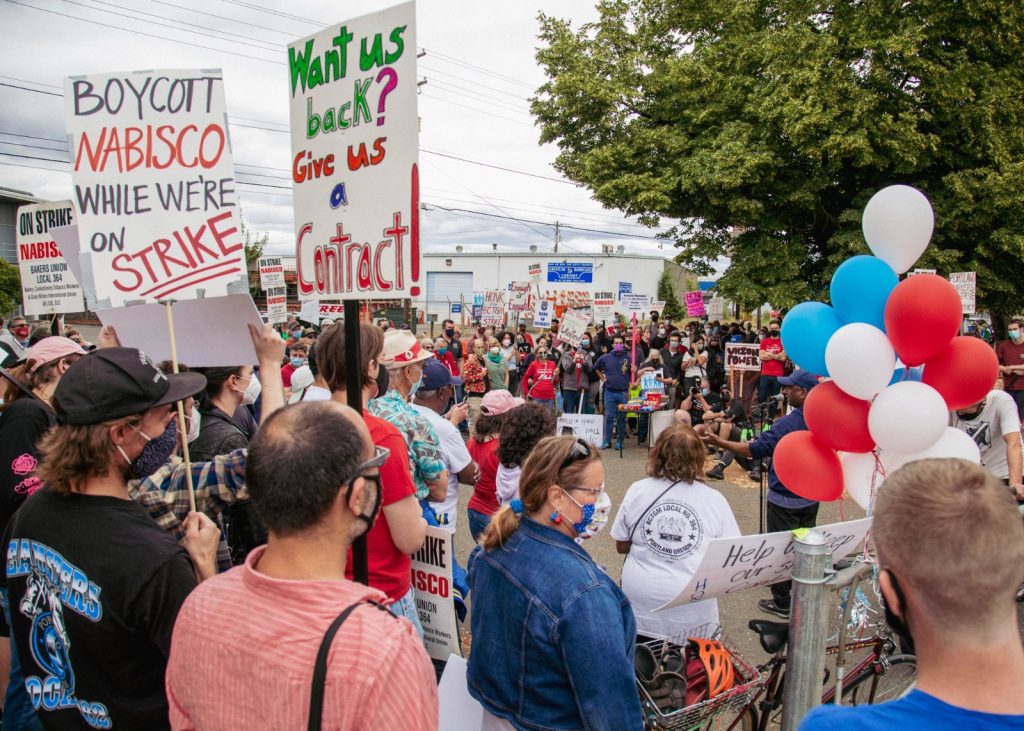

The Nabisco bakers strike in Portland, Oregon lasted forty days during August and September. The strikers were just trying to hold onto wages, schedules, and benefits that the company was determined to take away. Following Portland’s walkout, Nabisco workers in Chicago, Richmond, Denver and Atlanta also walked out. Workers kept the picket line in front of the huge plant on Portland’s Columbia Boulevard up 24/7. Only two or three out of their 200+ members crossed the line to go to work. Most other unions within the plant — machinists, electricians, engineers, teamsters — honored the picket line as well.
Community support for the strike was evident from the constantly honking vehicles driving past, the members of other unions that visited the line and crowded weekly solidarity rallies and boycott brigades, as well as community members who used a number of inventive techniques to interfere with strike breakers coming to and leaving the plant. While the Portland strikers overwhelmingly voted down the tentative agreement, they were out-voted by members in other cities, ending the strike.
All Nabisco-Mondelez plants have suffered outsourcing to Mexico, losing hundreds of jobs. Two U.S. plants shut altogether. Walking out risked another round of outsourcing. All the plants had majority black, brown, and Asian workforces, with large numbers of immigrants. The leadership of women of color was evident on the strike line and in the rallies.
In Chicago, Denver, Richmond, and Atlanta, union members were crossing the strike line. Even though Portland had been out the longest, they stayed the strongest. What made the difference?
Portland’s plant sits on the edge of the historically black Albina neighborhood, and generations of Nabisco workers have roots there. About half the workforce had more than twenty years of experience. Many workers had built trust with one another over decades, and the brutal overwork during the pandemic had cemented their willingness to take the plunge and walk out.
Within four days of the strike beginning, Portland DSA (Democratic Socialists of America) along with Portland Jobs with Justice organized a solidarity rally. For the next five Saturdays, the DSA and JwJ organized community rallies with clergy, politicians, union leaders, and most importantly, strikers themselves. The Oregon AFL-CIO also organized actions shining pro-strike spotlights on the plant and bringing the Thorns soccer team to the picket line.
At the core of that DSA-led solidarity was the Portland DSA Labor Working Group, which made this a unifying campaign across the chapter. We understood from the first days that this strike was likely to be protracted and had the potential to be transformative, for the strikers, for the local labor movement, and for DSA.
While we understand that the strike is the most powerful weapon of the working class and that the working class is the most powerful social force in our battle with the capitalist class, we knew that this hugely profitable, multi-national corporation had to be hit hard — halting production and damaging sales — if the bakers were going to just hold onto what they had. We also knew that, given the inexperience of this workforce and this community in militant class struggle, we were likely to lose. And, in fact, although the company backed off its attempt at two-tier healthcare, the ratified contract did eliminate weekend overtime and premium pay. But the battle was still well worth it.
Despite Portland’s disappointment in the final outcome, the bakers developed confidence, cohesion, competence, combativeness, and class consciousness during those forty days. As we praised them for showing us how to fight, we centered their stories, in interviews and in rallies, and they stepped up to speak. We also highlighted the critical role of the Machinists’ Union solidarity in disrupting production (they honored the picket line) and gave them a voice at the rallies. As we repeatedly blocked the scab buses and vans, in various creative ways, avoiding and deflecting police intervention (though tussling with private security), the strikers stepped up to block the supply trains (driven by union railroad engineers, who alerted strikers when they were arriving) and Teamster-driven supply trucks (who were talked & cajoled into backing out of the driveway). As the community (primarily individual DSA and JwJ members) raised $90,000 for the strike fund, “we got your back” became more than rhetoric.
Many community members who have never witnessed a strike learned up close and personal about what class warfare looks like, and are inspired to take on the next fight, whether in their own workplace or in solidarity with another strike. Many DSA members, who had participated in Black Lives Matter protests last summer and were trying to figure out how to engage in effective racial justice organizing, were exposed to a black and brown-led, multi-racial union based on deep connection and lasting solidarity.
Through their struggles and sacrifices, new and revived relationships, and the assistance of DSA and the labor movement, the striking bakers emerged with a new sense of power and their role in the working-class movement. Many now are asking “where is the next battle?” and some have joined the DSA.
“We’re gonna continue on,” says Donna Jo Marks, local 364 shop steward. “Our eyes have been opened. I’m at the next strike. I’m at the next rally. The fire I feel now, I know we’re going to win together.”
